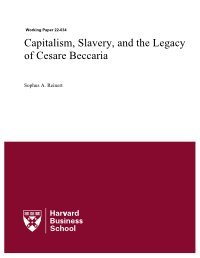By Sophus A. Reinert
The Milanese Marquis Cesare Beccaria (1738-1794) dedicated his life first to theorizing a more just and equal society grounded in individual rights, anchored in secular political economy rather than in religious dogma, then to realizing this bold vision through decades of administrative and regulatory work for the Milanese state. His project was not merely to reform the criminal system of the Old Regime but to challenge the very inequalities—legal, economic, educational, and so on—which drove crime to begin with.2 During his lifetime, however, his fame as a “friend of humanity” derived mostly from his impassioned pleas against torture and capital punishment, though on the basis of his temperament and his ideas it would also be easy to count him as part of what, for the later eighteenth century, the late Yves Bénot dubbed the “internationale abolitionniste.”3 This is, in large parts, also how he is remembered, but not only. It is of course a truism that ideas can have ironic, even sarcastic afterlives, but there is nonetheless something slightly perverse about Beccaria’s treatment in parts of American historiography.4 I have previously highlighted how his paternity has been claimed for both libertarian atheism and Catholic social democracy, but his name now appears ever more frequently in contemporary debates over “gun rights,” the “carceral state” and the rise of “racial capitalism.”5 We often hear of the “centrality of penal slavery” in Beccaria’s thought, for example, to the point where he repeatedly has been given the rather unenviable title of “father of prison slavery” and “father of penal servitude.”6 Some of these commentators are generous enough to admit that Beccaria can “be credited with voicing some humanitarian concerns,”
Boston, MA: Harvard Business School, 2021. 49p.


